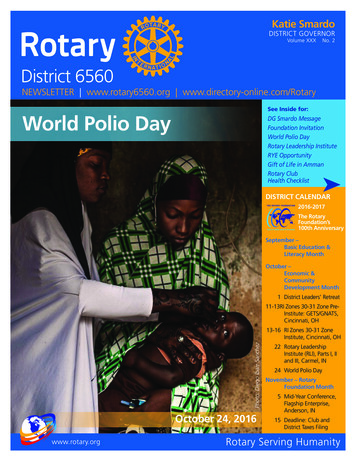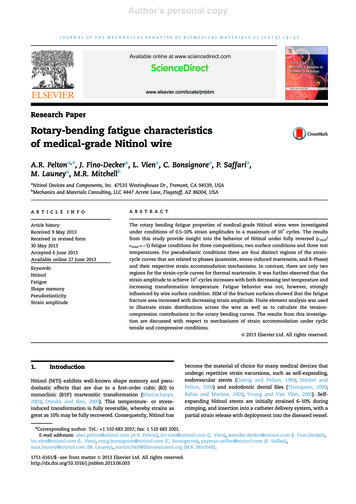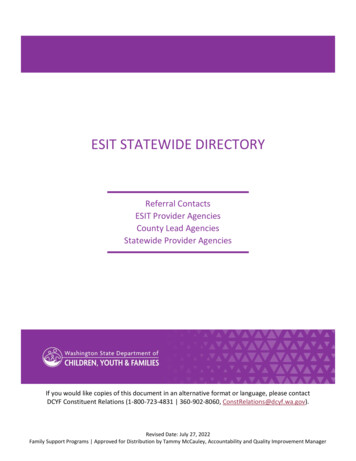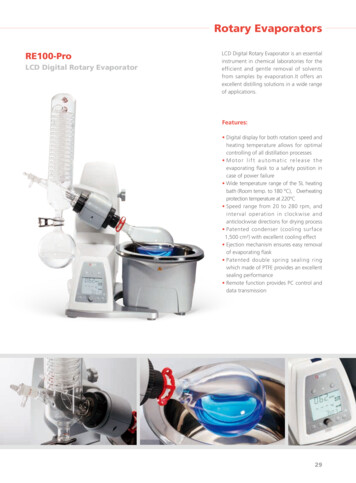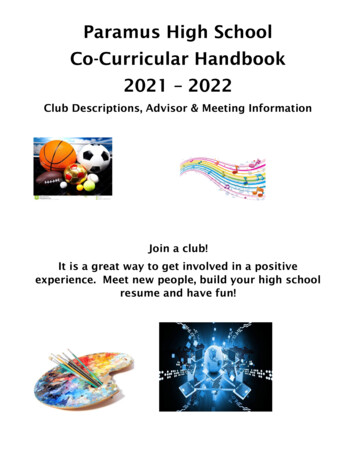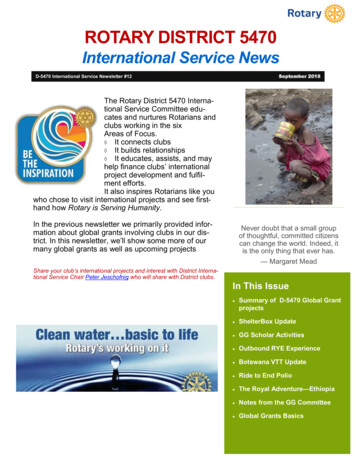
Transcription
ROTARY DISTRICT 5470International Service NewsSeptember 2018D-5470 International Service Newsletter #12The Rotary District 5470 International Service Committee educates and nurtures Rotarians andclubs working in the sixAreas of Focus. It connects clubs It builds relationships It educates, assists, and mayhelp finance clubs’ internationalproject development and fulfilment efforts.It also inspires Rotarians like youwho chose to visit international projects and see firsthand how Rotary is Serving Humanity.In the previous newsletter we primarily provided information about global grants involving clubs in our district. In this newsletter, we’ll show some more of ourmany global grants as well as upcoming projectsNever doubt that a small groupof thoughtful, committed citizenscan change the world. Indeed, itis the only thing that ever has.— Margaret MeadShare your club’s international projects and interest with District International Service Chair Peter Jeschofnig who will share with District clubs.In This Issue Summary of D-5470 Global Grantprojects ShelterBox Update GG Scholar Activities Outbound RYE Experience Botswana VTT Update Ride to End Polio The Royal Adventure—Ethiopia Notes from the GG Committee Global Grants Basics
Health Education for School Children in India.by Rahul Mehra, Ph.D. - Cañon City RCAbout two years ago, I received a District Grant to develop a curriculum for Health Education forschool children in India, write schoolbooks andTeacher’s Manuals for Grade 6 & 7 and get themprinted. It may seem strange that inspite of the highdisease burden in India, there is no comprehensiveHealth Education curriculum for school children in India and there are no books devoted to Health Education. Our long-term vision is that Health be a compulsory subject in every school and at every grade levelso that children can develop healthy habits and skills.This will allow each child to lead a productive life andreduce the prevalence of diseases and injuries. Ofcourse, any change in Policy takes time. I am happyto report that we have almost completed the first stepand the books are being printed. It took me two yearsto write the four books. The front cover of the fourbooks and the list of chapters are shown below.Now, the next phase of the project is to translate thefour books into Hindi and get them printed. I have received bids for this work and will be applying for aDistrict Grant for this milestone. Please let me know ifany clubs would be interested in participating. TheGrant for writing, illustrating, editing and printing thefour books in English was funded by the Rotary Clubof Canon City, Vail, Pueblo West and Buena Vista. Isincerely thank them for their contributions.Following thetranslations of these books, we plan to conduct a 1-2 yearevaluation of the curriculum in 1000 students of Grade 6 & 7from 20 schools in Chandigarh. The primary outcome to beevaluated will be health habits of the children. We will thenwrite the student books and teachers manuals on Health education for remaining grade levels. Armed with this informationand books, we hope to make Health Education mandatory inevery school in Chandigarh. We then plan to scale up to different states in India.For additional information, contact Dr. Rahul Mehra at:rahulmehra35@gmail.com2
Emergency Medicine in the Democratic Republic of Congo:The Dream and the NecessityBy Dr. Margaret Loewen, Lamar RCGreetings! I am an Emergency Medicine physician in Lamar, Colorado. My Rotary Club in Lamar was one ofthe organizations that financially supported the pilot project for Emergency Medicine Training in the DemocraticRepublic of Congo (DRC) in 2016. The video “Congo Emergency” that you just saw is a brief documentary ofthat project. Ken Kobre produced the film and shared it with us for publicity about this project around the world.Dr. Samuel Mampunza, as Vice-President of UniversiteProtestante au Congo (UPC), has initiated planning for Emergency Medicine Training for his entire country. The dream is tobring emergency medicine skills, training and integration ofemergency medicine practice into the healthcare system of theDRC. The necessity is based on a reality that is shocking. Congo is one of the poorest countries in the world with a populationof 80 million, ranked 168 out of 169 on the Human Development Index. In addition, it is at the bottom of two major indices:maternal mortality is 545 per 100,000 births and infant mortalityis 9.2%. Life expectancy in the DRC is 48 years.This project will integrate emergency medicine training into boththe undergraduate and postgraduate medical curricula of theUPC using educational resources developed by the AfricanFederation of Emergency Medicine and the World Health Organization. Dr. Mampunza has obtained the support of theDRC’s Ministry of Health in the development of its NationalEmergency Humanitarian Program, in particular the DisasterPreparedness and Response Strategy for the District of Kinshasa which has a population of 11 million.Dr. Muller Mundenga, featured in thevideo we saw, Emergency MedicineSpecialist for HEAL Africa who lives ineastern Congo, is working with the Lamar Rotary Club to write a Global Grantto fund the next phase of the project tobe implemented in 2020.As a result of the political instability andsafety concerns for foreigners travellinginto the DRC, The Rotary Foundationhas designated the DRC as a “no travelcountry” related to Global Grants. However, given the previous work of Dr. VeraSistenich with HandUp Congo and heraffiliation with the African Federation ofEmergency Medicine, the work in Congowill continue without foreign specialiststraveling into the DRC.The Kingabwa Club of Kinshasa has already agreed to be the in-country sponsoring Rotary Club. The Global Grant weare writing will have a total budget of no more than 100,000. We are going to start small, gain experience withthis next phase of the project, we will learn through doing, and find a way to help Dr. Mampunza make hisdream of preventing unnecessary deaths in Congo, through the development of Emergency Medicine Training,a reality.3
Emergency Medicine in the Democratic Republic of Congo:The Dream and the Necessity (continued)By Dr. Margaret Loewen, Lamar RCMotorcycle ambulance in DR of Congo(Conclusion was provided by Dr. Margaret Loewen after the presentation by Dr. Samuel Mampunza,Vice-President Universite Protestante au Congo at The Rotary Zone Institute 2018 for Zones 21B-27In Boise, Idaho, September 7, 2018)How can you help? We need clubs to support this project. Please contact me if you are interested inlearning more about the project. We are in the process of writing the Global Grant now and need clubsto commit support before we submit the application to TRF. We are appealing for funding from yourclubs to be designated for the 2019-2020 program year. My email address: mjloewen@hotmail.com.You can help us make a difference by saving lives in the Democratic Republic of Congo.4
Women’s Menstrual Health - TibetSubmitted by Eddie Cheung & Dr. Vanessa DaytonBased on feedback from TibetanVillage Project’s 2017 MedicalTeam, TVP worked about a yearto find volunteers and resources toorganize 2018 Medical Mission toTibet that focused on supportingwomen’s menstrual health by distributing 100 self-care kit alongwith conducting survey of 100women in five different locations.TVP had four volunteers travelingfrom Colorado to Tibet and thesevolunteers including Dr. VanessaDayton, Justin Dituri, Dituri andHyeawon Chae. In addition, TVPhad three local coordinators andtranslators: Lhamo Tso, Khando and Nyima Lhamo. Lhamo Tso expressed interest of leading this women’s health project and has done a small pilot project in her hometown before joining TVP’s 2018 MedicalTeam.Project Activities: 1. Durango Colorado Days for Girls Team 100 Kits 2. Students Shoulder toShoulder took them to Chengdu 3.Durango Daybreak Rotary Club donated 1,500 4. Durango Noon Rotary Club donated 1,000 5. TVPstored at Lhasa Restaurant andNamlha’s home 6. Judy Dituri madea sample Self-Care Kit bag 7.T.Lhamo Studio made 125 bags inChengdu 8. A local shop printedDromo Logo on the bags 9. Tamdinmade 10 T-shirts for volunteers 10.Sijia has purchased 400 underwears11. Lhamo Tso and Sijia have purchased additional kit contents 12. Medical team packaged Self-Care Kit in Chengdu 13. Vanessa wrotethe Health Booklet in English 14. Yonten made initial translation of the book 15. Lhamo Tso hired Lhakpato review and edit the booklet 16. Gyonpo Kyi, PhD teacher made final editing 17. Tamdin worked with alocal shop to print the booklet5
Women’s Menstrual Health - Tibet (continued)Submitted by Eddie Cheung & Dr. Vanessa DaytonWhat we learned: Despite the efforts being made by TVP and other NGOsto extend health care and health education in Tibet, most rural Tibetans,particularly women, still face enormous challenges: (1) there is very limitedaccess to health education; (2) the quality of available sanitation productsis poor; and (3) most women can not afford to pay for higher-quality careproducts that are available in urban areas. Most health facilities are concentrated at the county or higher level, but most of the Tibetan populationlives in rural areas. Thus, there is high incidence of serious diseases.Women especially face this due to hygiene-related illnesses at the township and village levels.6
ShelterBox & Rotary Providing Emergency Shelter in IndonesiaPam Pine: D-5470 ShelterBox RepresentativeOne month ago, the Indonesian islandof Lombok was violently struck by thefirst in a series of deadly quakes. Almost 1,000 aftershocks have occurred,causing more death and destruction,as the community tries to heal and rebuild. These multiple deadly quakeshave taken the lives of 515 people andhave left hundreds of thousands ofpeople displaced on the island.With aid in the region, ShelterBox hasbeen able to move quickly, workingwith Rotary in Lombok and the localgovernment to make sure we can getaid to families in desperate need. Ourvolunteer ShelterBox Response TeamMembers and Rotarians, Liz Odell(UK) and Brian Glenn (US), are working with Rotary International teams to deliver aid into the handsof the families who need it most.The single Rotary Club on Lombok has worked tirelessly since the first quake and their continuous assistance has made our response possible. ShelterBox has been working with the local Rotarians, District 3410 and District 3420 to transport emergency aid from storage in Jakarta to Lombok for distribution to the most vulnerable families.Update from Pam Pine: We arecurrently active in Indonesia andKenya, as well as several other deployments to ongoing crisis locations I did a 2 hour presentation toRYLA in June at the CMC campuswhere the kids learned about theShelterBox program and then theygot to work as a team to put up thefull tent. I am headed to the UKShelterBox international headquarters in Truro/Helston Cornwall thiscoming month and I will take picturesand write up an article for the nextissue.7
Jourdan McGinn - D-5470 Global Grant ScholarMSc in Public Health - London School of Hygiene and Tropical MedicineJourdan McGinn, our district’s Global Grant Scholar from 2015-17 has completed her studies withhighest honors at the London School of Hygiene and Tropical Medicine. Please read her letter to hersponsoring clubs about her experience.It is with great pleasure that Ishare with you my final report for my scholarship experience and Global Grant. I'veattached it here, and alsosubmitted it on the onlineportal.As I wrote this report, I wasoverwhelmed with gratitudefor the opportunity Rotaryhas given me to pursue myMasters degree--something Ithat would not have beenpossible without the supportof Rotary--and more importantly for each of you whomade this experience a reality and supported with a levelof generosity, care, and commitment that is unparalleled.I feel so fortunate to be sponsored by the ColoradoSprings and Broadmoor Clubs and to have been hosted by the Newport Pagnell Club. Each of youand the members of your clubs welcomed me with open arms, inspired me with your commitment todoing good in this world, and affirmed my passion for service.In the time since I completed my Masters and my Global Grant scholarship experience, I have secured a job with Partners in Health (PIH), a world leader in providing healthcare to the poorest andmost marginalized in the hardest hit corners of the globe.At PIH, I am the Director of Policy & Partnerships in Sierra Leone and am helping to lead our strategicpriority of radically reducing maternal mortality. Sierra Leone has the highest maternal death rate ofanywhere in the world – a woman has a 1 in 17 chance of dying in childbirth – a risk higher than inSyria, Afghanistan or even in the heart of Congo where there have been decades of conflict and war. Iwork with the national government, World Health Organization (WHO), United Nations, and other partners within Sierra Leone to help inform how to reduce maternal deaths and shape our own strategywithin PIH on what we can do to better save the lives of women and children.What Rotary has enabled me to do after my scholarship experience furthers Rotary Foundation'scommitment to saving the lives of women and children. In my role at PIH, I work everyday to expandaccess to quality care, so mothers and children everywhere can have the same opportunities for ahealthy future. While Rotary is no longer funding this work, it was made possible by their investment inme as a scholar and demonstrates the multiplicative and catalytic return on investment of the GlobalGrant program.I have no doubt we will continue to be in touch, and extend my gratitude to each of you and the members of your respective clubs for making my dream of pursing a masters possible. As we say in Sierra8Leone, tenki plenti.
How Rotary Youth Exchange (RYE) Impacted MeKayla Carter, Denmark D-1470, 2017-18During the clueless months leading up to my departure to Denmark, I knew only one thing for sure about the country I was tospend nearly a year in.It was as follows: danish delicious pastry.That fact was just fine to satisfy my personal need to be confident about my knowledge of Denmark, but the minute I I steppedonto Danish territory, the safety I felt knowing that fact can bestbe described as thinking a cardboard box could protect me froma hurricane.Now, I know that if I ever publicly refer to pastries as“danishes” while on Danish soil, I can expect to receive confusedstares and maybe a laugh or two. Just to spare any of you thehorror of making such an embarrassing mistake – maybe two orfifty times – the correct word to be used is “wienerbrød”. It'salright if you can't pronounce it. No one who was raisedspeaking Danish will expect foreigners to pronounce any Danishwords correctly. It's a widely known fact between all Danes – afact that I grew very accustomed to hearing.So I began the grueling process of learning a languageand culture through immersion. A language that everyone saidwould be difficult and would make me use muscles in my mouththat I had never used before. I often reflect fondly upon one ofmany moments that I was practicing Danish with my host mother, where, after an hour of unsuccessful attempts to practice pronouncing a new vowel, I stuck mytongue outside of mouth and pretended to throw up while saying a particularly tricky word. My hostmother became suddenly excited and shouted, “Ja, endelig!”, which is Danish for “Yes, finally!”.On that note, exchange also pushed my social limits. Not only was I always meeting new people and always putting my most agreeable side forward, but I also had a whole new culture to grasp. Aculture which, at first, I found foolish trying to incorporate into my own fixed version of how thingsshould be in the world, just as I felt foolish contorting my face in order to stumble over difficult words inmy limited Danish vocabulary. Over time, I managed to shake that mindset and embrace the culturethat I found absolutely fascinating after living just a year within Denmark's borders.Exchange has shaped me in a way that I guarantee no other experience could ever match.Stepping onto the plane that would hurl me across the ocean into a completely new, unpredictablechallenge, I had no idea that I would find myself in the unique way that I did.I learned that countries are human beings and that those humans will not always agree withyou. Beliefs are shaped by experiences, and the vast spectrum that all seven billion people on thisEarth rest upon differ enormously. Yet by simple inquisition and a mindset of curiosity towards understanding the world and the extraordinary people within it, you take one step towards creating a coherent world.I also came to appreciate the quirks of the culture I grew up in amid the whirlwind of another.Looking back at my country through the window of another, I was able to see how incredibly amazingit is to live where I live, learn what I learn, and experience what I experience. Through exchange, notonly was I able to grow to love another culture, but also strengthen the love I had for my own. It's arare opportunity that one is able to reflect in such an eye-opening way, and I could never be gratefulenough to have been given that chance by people who have shown and continue to show such generosity and understanding throughout their lives.To say that exchange broadened my perspective on the world would be an understatement. Ireceived the incredible opportunity to make lasting friendships across multiple borders and createconnections that would last forever. I saw, first-hand, how people are people no matter what countrythey're from or what language they speak, and how that fact alone makes us a very unique societyindeed.9
Vocational Training Team (VTT) for Botswana- Updateby Amy McBride - Montrose RCAmy is a member and Past President of the Rotary Club of Montrose. As a Peace Corps Volunteer inBotswana, she is working with two non-governmental organizations (NGOs) that serve people infectedand affected by HIV. She also is working with the Rotary Club of Gaborone and District 5470 to bringa Vocational Training Team (VTT) of four to six professionals to Botswana in 2019 to build NGO capacity to end AIDS by 2030. She is providing us with regular updates.Dumelang banni ba District 5470! (Setswana for Greetings residents of District 5470!)Since my last update, I’ve continued tomake slow but steady progress. I met withleaders of the Rotary Club of Gaborone tooutline their roles and responsibilities forthe VTT. These include: Identifying possible providers of services and helping to obtain quotations. Identifying experts in Botswana in various areas of CSO management toserve as possible mentors. Also, identifying a possible Monitoring & Evaluation consultant for the project. Hosting VTT members from Americaand Botswana during meetings/trainings in Gaborone. Maintaining and distributing funds. Assisting with public relations. Participating in the VTT Advisory Committee.I also worked with my Advisory Committee(made up of representatives from PeaceCorps Botswana, Project Concern International, Botswana Network of AIDS Support Organisations(BONASO), National AIDS Coordinating Agency (NACA), Botswana Council of Non-GovernmentalOrganisations, Stepping Stones International, and Bokgatla Bolokang Matshelo) to develop a surveyto determine the capacity-building needs of Botswana’s HIV-focused NGOs. We have selected 20NGOs for participation. They were chosen because: 1) each currently has a Peace Corps Volunteerwho can assist with establishing and maintaining the relationship with the US VTT member assignedto the NGO; and 2) the NGO has been vetted by Peace Corps as stable and able to profit from capacity-building efforts.The Volunteers’ first task is to help their NGO counterparts complete the survey. Not every NGO hasinternet, so they can’t complete the online version of the survey, but the Volunteers and many of theircounterparts have WhatsApp on their phones, so I distributed the survey that way, too. The deadlineis next Wednesday and I’ll need to get on the phone to prod more people and boost the participationrate. Once we have the results, the Advisory Committee will analyze them and determine the maincapacity-building areas for which we need to find professionals.10
VTT for Botswana—Update - (continued)by Amy McBride - Montrose RCWe first will look in Botswana. For example, several of thesurvey respondents have listed website and app development as a need. There are plenty of people doing this inBotswana, so we will contact some of them and see if theywill serve as mentors to NGOs. We will turn to the US tomeet the remaining needs. One that is mentioned by all respondents thus far is alternative ways to mobilize resources(aka fundraising), and since this is new territory in Botswana,we will need to find some US experts in this field to join theTeam.The survey is our “community assessment,” which is a newrequirement as of July 1st. Any club or district applying for aglobal grant to support a humanitarian project or a VTT mustconduct a community assessment first and include the results in the grant application.A security incident forced me to find another place to live andmy new house wasn’t ready yet, so I spent two weeks in thecapital city of Gaborone which was fortunate for this projectsince I could schedule meetings with some potential partners. One was with the Director of the Botswana BusinessCoalition on AIDS (BBCA), Frank Phatshwane. He has beenat his post for nearly two decades and will be an invaluableresource for helping to find NGO mentors in Botswana. Inexchange, he wants help setting up a “Private Sector Fund” to which businesses would contribute tosatisfy their “corporate social responsibility”commitment, and then the BBCA would oversee distribution of the funds, kind of how community foundations or United Way work in America. I also had productive meetings with Robinson Dimbungu fromNACA and Oscar Motsumi from BONASO.My next steps are to wrap up the survey/community assessment and distribute the results to my Advisory Committee so it can meet and set the areas of focus for the VTT and determine which needs canbe met domestically and which require US experts. Then the “International Rotary Partner Committee” (that’s you guys in Colorado, led by Dick Dangler of Edwards) springs into action, advertising forand selecting a VTT Leader and three to five Team members. The Committee also will lend its expertise to writing the global grant proposal to The Rotary Foundation.We also will execute memoranda of agreement between the Rotary Club of Gaborone and our fourCooperating Organizations, identify project Partners and determine their roles, outline major activitiesand draft a schedule, begin developing our public relations plan, set an initial budget and start gettingthe required three quotations for all major expenses, find and enlist our domestic experts, and a bunchof other things. My challenge is that the two NGOs for which I work have their own long lists of thingsthey want me to do, so I’m trying to balance their needs with this project. Luckily, they both are Cooperating Organizations, so they are donating part of their time with me to this effort.I also am trying to balance the work with a little play, so I’m writing this article from the back seat of myfriend Jon’s car (he’s part of the Host Rotary Partner Committee) while fellow PC Volunteer Sara is atthe wheel steering us down a highway in the Northern Cape region of South Africa on our way homefrom a weekend of wildflower viewing in Namaqualand. I am grateful to District 5470 and its supportof the Team, and to those of you who give to The Rotary Foundation, without which this project wouldn’t be possible. Feel free to contact me at amylopermcbride@gmail.com or on WhatsApp at19704338779 if you have any questions or comments.11
RIDE TO END POLIO—Nov. 11-17, 2018A ready-made fund raiser for clubs around the worldJoin the “Ride to End Polio” anywhere in world. Hop on a stationary bike the week of November 11and collect pledges for minutes instead of miles.Better yet, form a team in your Club or District includingRotarians, friends and family and ride together. Support polio eradication efforts Help your club or district reach its funding goal Enjoy fun, fitness, and fellowship with fellow Rotarians. Ridetoendpolio.orgFor additional information, contactKen Robinson, our D-5470 Polio Plus chair:rotarykar@gmail.com12
The Royal Adventure - North Shoa, EthiopiaBy Becky Kiser, East Colorado Springs RCOur Imprison Adventure began Monday morning around 6:00 a.m. This was without any running water since my almost forty-hour trip from the USA to Ethiopia. Although, I had used a bucket a fewtimes to rinse off and enjoyed a hair wash at a beauty salon the day before, I felt unready for moredust and dirt.The driver was waiting at 6:00 am and Tesfaye was kind enough to almost patiently wait for me to finish getting ready. We headed north about 7:00 a.m. The car had been checked the night before byTesfaye (a lesson learned from the original trip) and the ride was comfortable to Muki Turi. We passedour favorite coffee shop in Limi but it had been closed. We felt sad that we had not taken the phonenumber of the woman who ran it. It has been full of memories.We arrived in Muki Turi around 8:30 a.m. and stopped for a breakfast of meat. (I ate granola bars inthe car) After breakfast, we took the right-hand turn and began the three plus hour trip up the very dryand dusty mountains, down through the dry and dusty valleys and up the mountain into the AmharaVillage of Alem Ketema.After meeting with Ato Sileshi, Woreda Finance Expert, for a lunch of meat (again I waited in the car)We finished in time to walk through the streets of Alem Ketema where Trampled Rose girls were waiting to hold my hand and complete the rest of the distance with me. Only the ninth and tenth grade girlswere waiting for us on the school grounds because the older girls were taking their practice test for theNational Exam.We were first met by the two female teachers who had beengone for training on the day we held the original Royal Adventure. They both said they were amazed at the improvement inself-confidence and willingness to speak out that had occurredbecause of our training.We began our discussion just asking the girls what parts of theRoyal Adventure meant the most to them. The girl on the farright side of the photo, leaning in, spoke first and said that shehad learned that the key to happiness really is helping others.Group of Trampled Rose girls in Alem KetemaShe has been using part of her TR money to save to buy supplies for other students in she school who are “less fortunate”. She has also been volunteering hertime helping in the “welfare shop” where other children purchase supplies and the profit goes to othermale and female students in the school who are in need. Her teacher whispered to me thather involvement in the store had escalated her leadership skills.The next precious girl stood up and said she would never forget what Lourdes had taughther “You are wonderful” Other girls spoke about the story of Queen Esther and that theyloved having their drawing hanging on their walls, so they could remember to be courageous.13
The Royal Adventure - N. Shoa, Ethiopia (continued)By Becky Kiser, East Colorado Springs RCFinally, Tesfaye asked if they had used their letters. They all had the expression on their faces of having no idea at all what he was talking about. He coached them a little and they seemed to remembersomething, but it was clear those letters hadn’t been used since the day they received them.I felt disappointed, but we had known we were taking a risk that might not pay off. We were tryingsomething that hadn’t been tried before and there were no guarantees.As we were finishing up with the high school girls, the preparatory girls arrived.Tesfaye asked the girls the same questions and they almostjumped out of their seats to tell us the results. The first girlrecited the entire story of Queen Esther word for word andtold us that the day of the Royal Adventure she had promisedherself and God that she would begin that day to live a life ofhelping others. She said it had changed her life and that shehad been helping others wherever she found them.The next girl told us her favorite part was the letters. Shehad been using it to teach the preschoolers who live in hercompound. She said that she was disappointed that she hadPrepretoray Trampled Rose school girls in Alemonly been able to teach the little ones about ten letters. SheKetema. The sister of the girl in the middle front issaid the biggest difference was in her own English skills. Thenow in Debre Brehan University with a full scholarpractice exam she had just taken was so much easier beship in accountingcause when she got to a word she didn’t know she just took amoment and remembered the sounds of the letters and was able to figure out the word. The rest ofthe girls jumped in and said they had experienced the same thing.One especially sweet story is of Edjigiu, in the yellow shirt in the photo. She told us that she had practiced the letters with her sister in the seventh grade and they had learned all of them together and shenow knew the pronunciation of words she had mispronounced before. This is a special story becauseshe has been sponsored by Janet, who taught the phonetics part of the Royal Adventure on this trip,for four years.Next, we read a sweet message Janet sent and told the girls they could keep in touch with us fromuniversity by using the internet.It was a bittersweet parting. All seniors are expected to qualify easily for their scholarships to university, but it’s been four years of seeing their development and happy faces each time I visit
ROTARY DISTRICT 5470 International Service News In This Issue Summary of D-5470 Global Grant projects ShelterBox Update GG Scholar Activities Outbound RYE Experience Botswana VTT Update Ride to End Polio The Royal Adventure—Ethiopia Notes from the GG Committee Global Grants Basics The Rotary District 5470 Interna-tional Service Committee edu-
